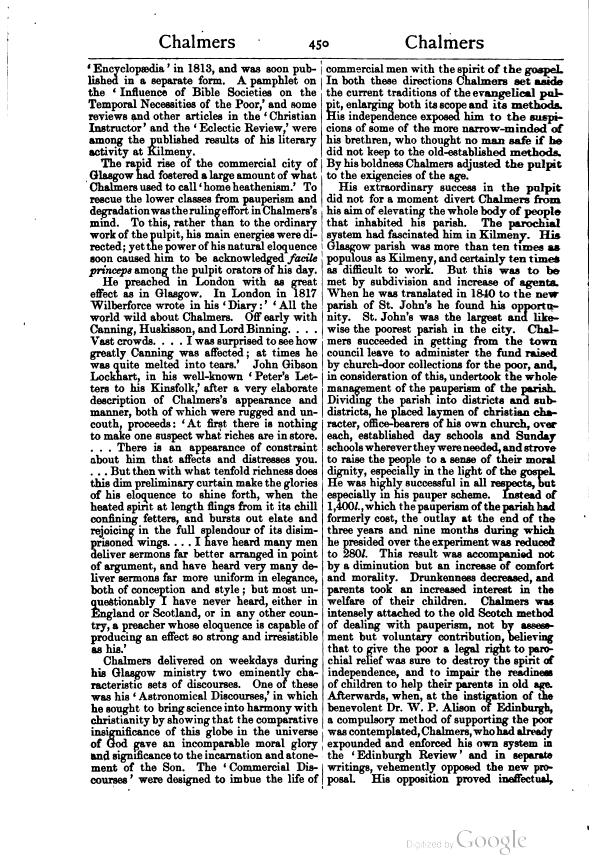‘Encyclopædia’ in 1813, and was soon published in a separate form. A pamphlet on the ‘Influence of Bible Societies on the Temporal Necessities of the Poor,’ and some reviews and other articles in the ‘Christian Instructor’ and the ‘Eclectic Review,’ were among the published results of his literary activity at Kilmeny.
The rapid rise of the commercial city of Glasgow had fostered a large amount of what Chalmers used to call ‘home heathenism.’ To rescue the lower classes from pauperism and degradation was the ruling effort in Chalmers's mind. To this, rather than to the ordinary work of the pulpit, his main energies were directed; yet the power of his natural eloquence soon caused him to be acknowledged facile princeps among the pulpit orators of his day.
He preached in London with as great effect as in Glasgow. In London in 1817 Wilberforce wrote in his ‘Diary:’ ‘All the world wild about Chalmers. Off early with Canning, Huskisson, and Lord Binning. … Vast crowds. … I was surprised to see how greatly Canning was affected; at times he was quite melted into tears.’ John Gibson Lockhart, in his well-known ‘Peter's Letters to his Kinsfolk,’ after a very elaborate description of Chalmers's appearance and manner, both of which were rugged and uncouth, proceeds: ‘At first there is nothing to make one suspect what riches are in store. … There is an appearance of constraint about him that affects and distresses you. … But then with what tenfold richness does this dim preliminary curtain make the glories of his eloquence to shine forth, when the heated spirit at length flings from it its chill confining fetters, and bursts out elate and rejoicing in the full splendour of its disimprisoned wings. … I have heard many men deliver sermons far better arranged in point of argument, and have heard very many deliver sermons far more uniform in elegance, both of conception and style; but most unquestionably I have never heard, either in England or Scotland, or in any other country, a preacher whose eloquence is capable of producing an effect so strong and irresistible as his.’
Chalmers delivered on weekdays during his Glasgow ministry two eminently characteristic sets of discourses. One of these was his ‘Astronomical Discourses,’ in which he sought to bring science into harmony with christianity by showing that the comparative insignificance of this globe in the universe of God gave an incomparable moral glory and significance to the incarnation and atonement of the Son. The ‘Commercial Discourses’ were designed to imbue the life of commercial men with the spirit of the gospel. In both these directions Chalmers set aside the current traditions of the evangelical pulpit, enlarging both its scope and its methods. His independence exposed him to the suspicions of some of the more narrow-minded of his brethren, who thought no man safe if he did not keep to the old-established methods. By his boldness Chalmers adjusted the pulpit to the exigencies of the age.
His extraordinary success in the pulpit did not for a moment divert Chalmers from his aim of elevating the whole body of people that inhabited his parish. The parochial system had fascinated him in Kilmeny. His Glasgow parish was more than ten times as populous as Kilmeny, and certainly ten times as difficult to work. But this was to be met by subdivision and increase of agents. When he was translated in 1820 to the new parish of St. John's he found his opportunity. St. John's was the largest and likewise the poorest parish in the city. Chalmers succeeded in getting from the town council leave to administer the fund raised by church-door collections for the poor, and, in consideration of this, undertook the whole management of the pauperism of the parish. Dividing the parish into districts and sub-districts, he placed laymen of christian character, office-bearers of his own church, over each, established day schools and Sunday schools wherever they were needed, and strove to raise the people to a sense of their moral dignity, especially in the light of the gospel. He was highly successful in all respects, but especially in his pauper scheme. Instead of 1,400l., which the pauperism of the parish had formerly cost, the outlay at the end of the three years and nine months during which he presided over the experiment was reduced to 280l. This result was accompanied not by a diminution but an increase of comfort and morality. Drunkenness decreased, and parents took an increased interest in the welfare of their children. Chalmers was intensely attached to the old Scotch method of dealing with pauperism, not by assessment but voluntary contribution, believing that to give the poor a legal right to parochial relief was sure to destroy the spirit of independence, and to impair the readiness of children to help their parents in old age. Afterwards, when, at the instigation of the benevolent Dr. W. P. Alison of Edinburgh, a compulsory method of supporting the poor was contemplated, Chalmers, who had already expounded and enforced his own system in the ‘Edinburgh Review’ and in separate writings, vehemently opposed the new proposal. His opposition proved ineffectual,
